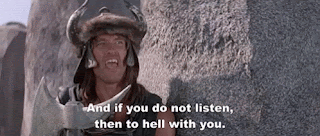I like movies. I really do. Need I say this?
I mean, not liking movies is akin to not liking ice cream. It’s un-American. Heck, it’s inhuman.
I’ve posted numerous reviews of my favorite films. I seem to have a sweet spot for the early 80s, the likes of Blade Runner and Terminator and Excalibur and The Road Warrior (throw in Raiders and the Goonies for good measure). But I watch and enjoy new films too.
Now that I’ve paid my homage to celluloid, I’m not particularly fond of the fetishization of film by lovers of classic characters and IP. The incessant cry of, “this is such an awesome character, but when are we ever going to get the movie!”
Let’s take Conan. We have the amazing Robert E. Howard stories. We’ve got shit-tons of terrific comics, including great new material today from Titan. Pastiche novels. Even a loosely adapted but nevertheless magnificent 1982 film. So when I hear the incessant, when are we going to get a real Robert E. Howard film. We need one! It cheapens what has been done already. Just a bit, and IMO.
But you don’t understand Brian, we need a proper Conan film.
Why? Why do we need one?
I just don’t have the same hand-wringing urgency to get a movie made.
Here’s my question to the people I can feel protesting this post.
When was the last time you said, “that was an AWESOME movie… they really need to write the novelization! Like, now!”
The answer is… never.
Seriously, when was the last time you ever heard ANYONE say, “I love Furiosa… when is George Miller going to get an author to write the novel? That’s what we really need.”
I’ll wait.
When you always want “the movie” you are signifying an artistic hierarchy, one that places movies at the top and television in the middle (“it needs to be made into a Netflix miniseries!”) and poor old books at the bottom—perhaps just above static paintings or digital art.
Captain obvious incoming, but films and books are different mediums. Which means they do some things better than the other.
Films have many inherent advantages over books. The visuals are obvious. But also, sound. The wonderful dialogue, pregnant pauses and raised voices that convey additional levels of meaning are very hard to replicate in a book. And also, wonderful scores. Seriously, just hearing John Williams’ opening theme from Jaws immediately sends hackles up my spine and makes me nervous even when I’m in the neighbor’s swimming pool.
It’s awesome. Books can’t do this.
This combination of gorgeous visuals and stunning sound sweep us up, and make a great movie in an IMAX theater a thing of beauty. An event that I’m glad we have. Did I mention I love movies? I was blown away by Maverick and 1917 and of course The Lord of the Rings (though the book is better).
But books have their own distinct advantages too—advantages even over film. Like character interiority. This is very hard to do in a film, without awkward voiceovers.
Unbridled imagination is another. Film budgets and run times reign in possibility. Because budgets are an issue, the sprawling sweep of a book must be a dramatized compression on the screen. And thus worlds feel smaller than in the book. The Lord of the Rings is a prime example. I love the films, but Middle-Earth isn’t as big, or as grand, as Tolkien's vision.
The third is the unknown—HP Lovecraft can describe something awful beyond our imagination by not showing it. In film, which is purely visual, something must be shown. And it’s rarely as good as our imagination.
But the most important is artistic integrity.
Because movies are made by hundreds if not thousands of people, and because they cost so much, many fingers must touch the final product—including studio executives hungry for a return on their big investment, and their shareholders. Which means, compromises are made.
An author with a single artistic vision has inherent advantages, if they are talented and that vision is true and powerful. As a result books tend to have sharper edges and brighter colors.
I mean does anyone think we’d actually get an accurate “Red Nails” or “The Man-Eaters of Zamboula”? I don’t.
Even if homemade movies made on the cheap but well, by some guy in a basement with cutting-edge AI and a computer render some of these arguments invalid, the underlying principle remains: Books do some things better than film. Which means there are novels that will always, from now until the sun turns cold and dark and burns out altogether in the far-flung future, be better than any movie adaptation.
OK, we do need a Dying Earth movie.
But if we don’t get one? It’s OK.
The world will keep spinning.
We’ve already got Vance’s book … and the book is better.




